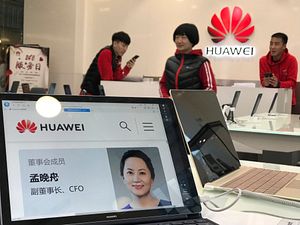On December 5, Canadian authorities confirmed that Meng Wanzhou, chief financial officer and deputy chair of Chinese telecoms giant Huawei as well as a daughter of Huawei’s founder, was arrested in Vancouver, British Columbia on December 1 at the request of U.S. law enforcement authorities.
“She is sought for extradition by the United States, and a bail hearing has been set for Friday,” Canadian Justice Department spokesman Ian McLeod said in a statement to The Globe and Mail.
“As there is a publication ban in effect, we cannot provide any further detail at this time. The ban was sought by Ms. Meng,” the spokesman added.
An anonymous Canadian law-enforcement source told The Globe and Mail that the United States is alleging Meng tried to evade U.S. sanctions against Iran. Early in April, Reuters had reported that since at least 2016, the U.S. attorney’s office in Brooklyn has been probing Huawei’s alleged shipping of U.S.-origin products to Iran and other countries in violation of U.S. export and sanctions laws.
Faced with this explosive report, Huawei first denied the story, calling the report “unfounded.” But hours later, Huawei released a statement on its official Weibo account, not only confirming the arrest but revealing more information.
The statement said that Meng has been “temporarily detained” when she was “transferring flights in Canada” and that Meng faces “unspecified charges in the Eastern District of New York.”
“The company has been provided with very little information regarding the charges and is not aware of any wrongdoing by Ms. Meng. The company believes the Canadian and U.S. legal systems will ultimately reach a just conclusion,” the statement continued. “Huawei complies with all applicable laws and regulations where it operates, including applicable export control and sanction laws.”
It’s noteworthy that Huawei adopted a highly cautious and moderate tone in the statement. In comparison, the response of Chinese government was considerably strong and even “hostile,” as some foreign reporters put it.
In a statement posted on December 6 on its official website, the Chinese Embassy in Canada claimed that Meng did not violate “any American or Canadian law.”
The statement stressed:
The Chinese side firmly opposes and strongly protests over such kind of actions which seriously harmed the human rights of the victim. The Chinese side has lodged stern representations with the U.S. and Canadian side, and urged them to immediately correct the wrongdoing and restore the personal freedom of Ms. Meng Wanzhou. We will closely follow the development of the issue and take all measures to resolutely protect the legitimate rights and interests of Chinese citizens.
Hours later, at a regular press briefing, Chinese Foreign Ministry Spokesperson Geng Shuang maintained this strong stance.
Confirming that China has lodged stern representations the United States and Canada, Geng demanded that Canada “immediately clarify the reasons for this detention, immediately release the detainee, and effectively protect the legitimate rights of the detainee.”
It’s particularly worth noting that Meng was arrested on the same day that U.S. President Donald Trump and his Chinese counterpart Xi Jinping held a significant bilateral meeting in Buenos Aires, Argentina. In this meeting, both top leaders agreed on a trade ceasefire.
Thus, the arrest of Meng — which apparently had been planned through coordination by both Canadian and U.S. authorities — was seen by many hawkish Chinese analysts as a sign that the U.S. government does not really intend to suspend aggressive actions against China.
Hu Xijin, editor-in-chief of the Global Times (one of China’s most hawkish state-run newspapers), commented on his Twitter account that “The U.S. can’t beat Huawei in the market. Don’t act like a despicable rogue.” He also claimed that the incident “will seriously impact China and the U.S. implementing consensus reached between two state leaders.”
However, according to a recent report by The South China Morning Post, on October 29, Meng had told Huawei employees in an internal talk on compliance that there are scenarios where the company can weigh the costs and accept the risks of not meeting the requirements of the law.
The SCMP obtained a transcript of an internal question-and-answer between Meng and her father, Huawei’s founder Ren Zhengfei.
According to the transcript distributed to Huawei employees, Meng said:
…there may still be another scenario, and that is where the external rules are clear-cut and there’s no contention, but the company is totally unable to comply with [the rules] in actual operations. In such cases, after a reasonable decision-making process, one may accept the risk of temporary non-compliance.
Ren responded: “We must not bind ourselves up just because the U.S. is attacking us. If our hands and feet are bound, then we will not be able to continue producing, then what’s the point of compliance?”
Huawei declined to comment or verify the contents of the transcript. But if the transcript the SCMP obtained is genuine, the dialogue helps explain the background of Meng’s arrest in Canada.

































